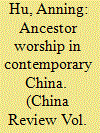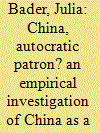|
|
|
Sort Order |
|
|
|
Items / Page
|
|
|
|
|
|
|
| Srl | Item |
| 1 |
ID:
144096


|
|
|
|
|
| Summary/Abstract |
Although ancestor worship has been widely acknowledged as one of the most significant cultural traditions in Chinese society, information about its nationwide popularity and followers’ sociodemographic characteristics is still not clear. Taking advantage of the first nationwide survey on Chinese residents’ spiritual life, this study examines: (1) the extent of popularity of typical ancestor worship practices, (2) the sociodemographic features of ancestor worship individuals, and (3) the “magical” elements of ancestor worship activities. Empirical results suggest that, first, the most popular ancestor worship practices in contemporary China are venerating the spirits of ancestors or deceased relatives and visiting the gravesite of ancestors. Ancestor worship practice participants make up over 70 percent of the adult population. Second, on average, males are more active in ancestor worship than females. Also, economic status is positively associated with ancestor worship participation. Nevertheless, urbanization and migration have a negative effect on people’s propensity of practicing ancestor worship. Third, the magical aspect of ancestor worship is less attractive to well-educated adults, but more likely to be followed by senior individuals.
|
|
|
|
|
|
|
|
|
|
|
|
|
|
|
|
| 2 |
ID:
138296


|
|
|
|
|
| Summary/Abstract |
Critics frequently accuse China of acting as a patron for autocratic states. But does Chinese engagement actually increase the stability of authoritarian clients? This article demonstrates that Chinese bilateral interactions have little effect on the longevity of autocratic regimes. Analyses of different forms of Chinese bilateral engagement between 1993 and 2008—including state visits, arms trading, aid projects, economic cooperation, and trade dependence—show that only export dependence on China may increase the likelihood of survival for autocratic regimes while doing little to stabilize their democratic counterparts.
|
|
|
|
|
|
|
|
|
|
|
|
|
|
|
|
| 3 |
ID:
102576


|
|
|
|
|
| Publication |
2011.
|
| Summary/Abstract |
Scholars have repeatedly expressed concern about the consequences low levels of political trust might have for the stability of democratic political systems. Empirical support and the identification of causal mechanisms for this concern, however, are often lacking. In this article, the relation between political trust and law-abiding attitudes is investigated. It is expected that citizens with low levels of trust in the institutions of the political system will find it more acceptable to break the law. As a result, low levels of political trust might undermine the effectiveness and legitimacy of government action and its ability to implement legislation. Based on survey data from 33 European countries using the 1999-2001 European Values Study (N = 41,125), the relation between political trust and legal permissiveness is examined using a multilevel ordered logistic regression analysis. The results show that respondents with low levels of political trust are significantly more likely to accept illegal behaviour such as tax fraud than respondents with high levels of political trust. Since it is known from earlier research that actors who are permissive towards law-breaking behaviour are more likely to commit these acts themselves, the hypothesis that low levels of political trust will be associated with less law compliance within a society is supported.
|
|
|
|
|
|
|
|
|
|
|
|
|
|
|
|
| 4 |
ID:
160243


|
|
|
|
|
| Summary/Abstract |
The security dilemma describes the tragic spiral ensuing from states’ attempts to enhance their security under anarchy. Even in a world consisting solely of status quo-oriented states, the outcome of the dilemma is, in theory, increased conflict and reduced security for all. After the Cold War ended many voices claimed that the security dilemma was mainly a thing of the past. Others, however, disagreed, arguing that security competition and interstate conflict would still be prominent features of the international system. We provide relevant empirical tests of such stances which attempt to reveal whether action–reaction dynamics have been prevalent in the post-Cold War period, with data covering 150 countries and spanning the period 1988–2014. Our dependent variable uses data on the changes in states’ military spending; our main independent variable codes the weighted average of arms spending changes among neighbouring states. Thereby we get a novel measure of whether states in general structure their military budgets according to the alterations in neighbouring countries’ military capacity. Our results indicate that this is indeed the case; the security dilemma, and action–reaction forms of behaviour more broadly (including both ‘vicious’ and ‘virtuous’ cycles), are still key mechanisms in the international system. This relationship holds for the entire post-Cold War period, though results for the last five to six years are particularly strong.
|
|
|
|
|
|
|
|
|
|
|
|
|
|
|
|
|
|
|
|
|